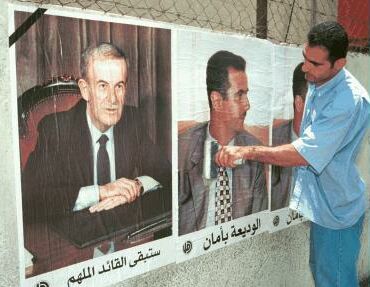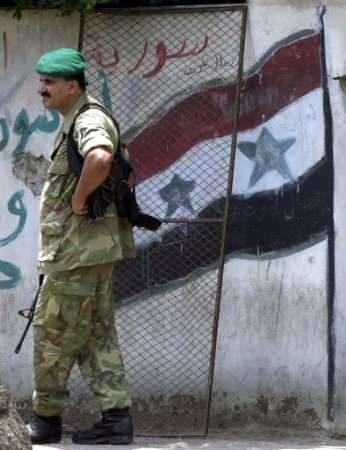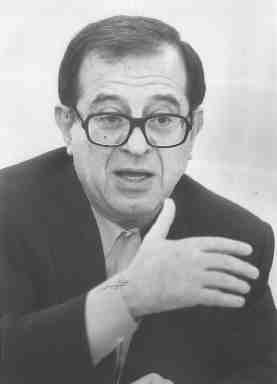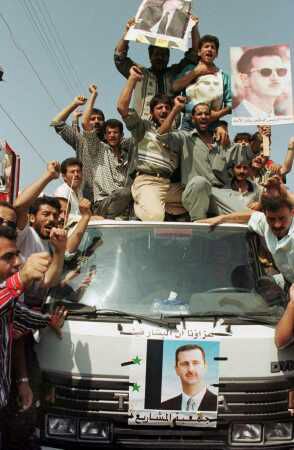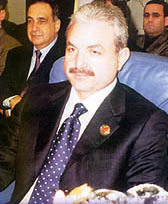There is evidently another master dictating on the legislators what to do and they obey. They cannot possibly be the masters of themselves. We know it. We are not fools. Hobeika, Elias Joseph (Elie Hobeika) Born in Kleiat in the Kessruan in 1956. He had stopped school at the age of 16. When the war broke out Hobeika joined a crack unit of the Phalange and by 1977 he was commander of the southern sector of Lebanon. In the early stages of the war he was known as Edward and then as H.K, after a machine gun called a 'Heckler and Koch' which he used in the battle of Beirut and the Karantina in 1978. During a lull in the fighting, he was placed briefly at the Banco Di Brazil in Beirut in 1978 as an office boy. As fighting erupted again he went back to the lines and was promoted to head of the third division of the Phalange incharge of special operations and in 1979 promoted to security chief of the Lebanese Forces as head of Intelligence.
Hobeika married Gina Raymond Nachaty in 1981. He had a baby girl Sabine in 81, and she died in tragic circumstances in 1982. He had a boy Joseph in 1983.
In 1982 he commanded the massacre of Sabra and Chatila.
As support for the Lebanese Forces started to decline in 1983 Samir Geagea, Karim Pakradouni, and Elie Hobeika forced the resignation of the then commander of the Lebanese Forces, Fouad Abu Nadir. Elie Hobeika was named head of its executive committee.
On January 15, 1986, Samir Geagea led a movement that removed Elie Hobeika and due to the improprieties and, above all, to his having signed the 'Tripartite Accord' with Syria. It was strongly held that he had been actively courting Syria and betraying Lebanon. Hobieka fled to Syria where he learned English and French and took a Computer course. His few followers were stationed in Zahle. In september 1986, with Syrian and Druze support he ordered his men to attack Ashrafieh from West Beirut, and after an occupation of some streets that lasted a few hours he was totally defeated, those of his men that survived went back to Zahle and he remained in Syria.
In 1990 his men fought alongside the Syrians against General Aoun and so Hobeika was rewarded with a number of ministerial posts.
Hobeika has been implicated in a great number of murders and assisnations, including that of Dany Chamoun. Today he is a member of Parliament.
Dany Chamoun
?????  Kanaan, Ghazi. Commander of Syrian intelligence in Lebanon. All high-ranking Lebanese officials report directly to Kanaan and he has the final word on all major political and security decisions made by the Lebanese government.
Kanaan was born in 1943 to a prominent Alawite family in the village of Bhamra near Kerdaha (Syrian President Hafez Assad's hometown) in the mountains overlooking the seaport city of Latakia. Contrary to many reports, Kanaan is not related to Assad, but their two families have had a long historical alliance. Like Assad and other senior Syrian officials, he joined the military early in his career, reportedly commanding an army unit facing Israeli forces in the Golan Heights during the 1970s. Kanaan rapidly advanced through the army officer corps. He attained the rank of Colonel and served as head of Syrian intelligence in Homs until 1982, when he was appointed to replace Gen. Mohammad Ghanem as the commander of the 'Mukhabarat' (Syrian Intelligence), in Lebanon.
During the Lebanese war, intelligence forces under Kanaan's command established their headquarters in Anjar, an Armenian village in the Bekaa Valley where, in the 18th century, Lebanese prince Fakhr al-Din defeated the Ottoman ruler of Damascus and imprisoned him in a cage. Additional bases and detention facilities have been established in West Beirut on Sadat Street and in the Ramlet al-Baida neighborhood near the Beau Rivage Hotel, in Tripoli, Chtoura and Hazmiyeh.
Kanaan is credited with gradually tightening Syria's grip over the Lebanese government during the 1980s by cultivating alliances with members of Lebanon's militia elite. In 1983, Kanaan ordered his militia allies to torpedo the May 17th Agreement between Lebanon and Israel that was brokered by former U.S. Secretary of State George Shultz. In 1984, Kanaan masterminded the February 6 mutiny in West Beirut that led to the breakdown of the Lebanese central government and the withdrawal of multinational peacekeeping forces, including U.S. Marines, from Lebanon.
By the late 1980's, Syrian influence pervaded throughout the country as militia leaders of all sectarian persuasions came under Kanaan's influence. Those who resisted Syrian influence were either assassinated like Hasan Khalid, the Mufti of Lebanon's Sunni Muslim community, in 1989 or abducted and imprisoned by Kanaan's forces like the leaders of the Sunni Tawhid al-Islami movement and the pro-Iraqi wing of the Ba'ath Party in the mid-1980's.
Kanaan's most significant achievement during the 1980's was his successful effort to lure collaborators within the predominantly Christian (and ostensibly anti Syrian) Lebanese Forces (LF) militia. This process began in 1985 with the defection to Syria of LF Commander Elie Hobeika and culminated with the decision of LF Commander Samir Geagea to collaborate with Damascus in October 1990, when Syrian forces invaded East Beirut and ousted the constitutional government of Lebanon headed by interim Prime Minister Michel Aoun.
After Aoun's removal from power, Syrian control of Lebanese politics became complete. Since 1990, Kanaan has literally become the "king maker" in Lebanese politics as the election of the president is strictly subject to his official approval. In October 1995, just weeks before the expiration of Lebanese President Elias Hrawi's term in office, Kanaan attended a party hosted by former prime minister Umar Karami and announced to the numerous MPs present that they were to amend article 49 of the constitution and extend Hrawi's tenure for three more years. According accounts of the evening, published by Mideast Mirror and al-Hayat newspaper on 2nd October 1995:
'Kanaan then raised his hand, saying that the vote would take place by a raising of hands and would not be secret . . . Everyone looked as if they had just been through a cold shower . . . The party broke up early. Presidential hopefuls departed with their wives, one complaining of tiredness, another saying he had a headache.'
Less than a month later, the parliamentarians obediently convened and extended Hrawi's term in office. More recently, Kanaan personally oversaw the formulation of a new law late in 1999, which strongly preordained the election of pro Syrian candidates in Lebanon's parliamentary elections in August 2000.
Kanaan's power extends far beyond his political capacity. Due to the extensive network of Syrian intelligence officers and local operatives under his command, little of importance happens in Lebanon without his knowledge. The commander of Lebanon's Sureté Générale, Maj. Gen. Jamil Sayyed, reports directly to Kanaan, often bypassing the civilian leadership of the Lebanese regime. Since Kanaan has the power to order the arrest and indefinite detention of anyone in the country, he is the most feared man in the Lebanon.
Kanaan, known to his associates as Abu Yo'roub, has used his influence for personal gain as well. His involvement in narcotics production and trafficking in the Bekaa Valley, counterfeiting and other illegal activities have made him a very wealthy man. With the shadow of Syrian power lurking behind him, few in Lebanon are willing to stand their ground in disputes with Kanaan. One who did is Yahya Shamas, a former member of parliament and long-time associate of Kanaan's who made the mistake of buying a piece of real estate from the Syrian general and then refusing to sell it back when its value started rapidly appreciating. Shamas was quickly jailed on drug trafficking charges in 1994 and imprisoned. Kanaan is even rumoured to have had affairs with the wives of numerous Syrian backed Lebanese politicians who could not object.
Kanaan's success in subduing Lebanon has earned him tremendous accolades in Damascus and he reportedly has a good chance of replacing Ali Douba as the overall head of intelligence in Syria. Assif Shawkat, the son-in-law of President Assad (married to his daughter Bushra) is said to be competing against Kanaan for the job. Kanaan's early support of Bashar Assad, the son and apparent successor of President Assad, considerably strengthened his chances. He also has good relations with several American officials, particularly in the intelligence community, and has visited Washington DC on at least one occasion (February 1992). As a result, his political future in Damascus is considered to be very bright
The masterminders 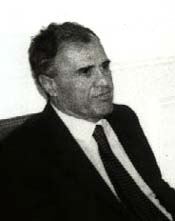
The slaves Lebanese officer guarding the syrian flag 
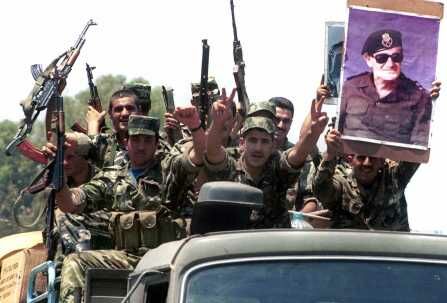
Libanosyrian Libanosyrian MP 
This is in Lebanon not in Syria |

